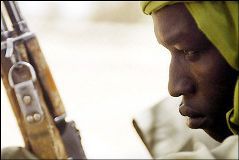Rebesl: Sudan ‘s Darfur talks may face breaking point
By GILBERT DA COSTA, Associated Press Writer
ABUJA, Nigeria, Sep 14, 2004 (AP) — African leaders tried Tuesday to push peace talks for Sudan’s troubled Darfur region past a stalemate, with Nigerian President Olusegun Obasanjo — the talks’ host — convening with far-apart rebel and government sides.
 Rebels said the meeting, which was underway late Tuesday, would determine whether the internationally brokered, 3-week-old peace talks keep going.
Rebels said the meeting, which was underway late Tuesday, would determine whether the internationally brokered, 3-week-old peace talks keep going.
Little progress has been reported since talks opened Aug. 23 with the aim of calming Sudan’s western region of Darfur _ where tens of thousands have been killed and 1.2 million rendered homeless in what the United States calls a genocide campaign by government-allied Sudanese militia.
Mediators a week ago were calling the talks deadlocked. Rebels raised the prospect Tuesday that the talks would collapse.
With concern mounting, both sides gathered for a closed-door meeting with Obasanjo, current head of the 52-nation African Union, and other top AU officials.
The session “will decide whether it will be the end of the talks or not,” top rebel delegate Ahmed Tugod Lissan said.
Lissan did not say what demands rebels would make of Obasanjo, and there was no immediate word of any compromises overall.
Insurgent and government delegates have differed on a raft of issues, with disagreements centering on how to return security to the western Sudan region where rebels took up arms 19 months ago.
Earlier Darfur peace talks held in Ethiopia broke down in July.
On Thursday, U.S. Secretary of State Colin Powell said government-allied Arab militia known as Janjaweed had carried out acts of genocide against the region’s non-Arab villagers.
The genocide declaration carried with it an increased threat of strong international action.
Sudan’s government rejects accusations that it backs the Janjaweed militias, which launched a violent campaign against Darfur’s non-Arab farmers after two rebel groups took up arms in the region in February 2003.
Sudanese government delegates repeated charges Tuesday that Powell’s genocide declaration imperiled the talks. Sudanese officials insisted they would stick with the peace efforts, however.
“We’re very anxious to address the problems in Darfur. But we think some external forces, including Colin Powell, are not helping matters,” said Najeeb El-Khair Abdel Wahab, the Sudanese deputy foreign minister.
“We believe it’s still possible to have meaningful talks and reach agreement on the issues we’re talking about,” the Sudanese official said.
The United States has proposed a U.N. resolution threatening penalties against Sudan’s fledgling oil industry to pressure Sudan to stop the violence and improve the humanitarian situation in Darfur.
Mark Schneider, an analyst for the Brussels-based research organization International Crisis Group, said Sudan’s government benefits from the stalled peace talks.
“By being in Abuja and showing willingness to discuss even to some degree, the government can delay sanctions at the U.N. and they also respond to the African Union and Nigeria’s growing concerns with the humanitarian crisis and atrocities in Darfur,” Schneider said by telephone from Washington, D.C.
“With both of these, the government shows it can play out the issues without a final reckoning,” he said. “There’s also pressure on the rebels not to walk away as long as there’s discussion.
“It’s in the interest of the rebels and the government not to be charged with recalcitrance.”
On Monday, the U.N. World Health Organizations released a survey estimating disease and attacks are now killing between 6,000 to 10,000 of Darfur’s refugees each month.
European Union foreign ministers urged Sudan to implement a cease-fire in Darfur or face U.N. sanctions, including the possible oil embargo. They also called for the United Nations to “immediately investigate” whether atrocities in Darfur constitute genocide.
The African Union currently has 80 military observers protected by 300 troops in Darfur, where they’re monitoring an oft-violated April ceasefire agreement.
AU officials propose a 3,000-strong peacekeeping force with a mandate to protect civilians. Khartoum has dismissed the idea, saying it alone is responsible for internal security.
